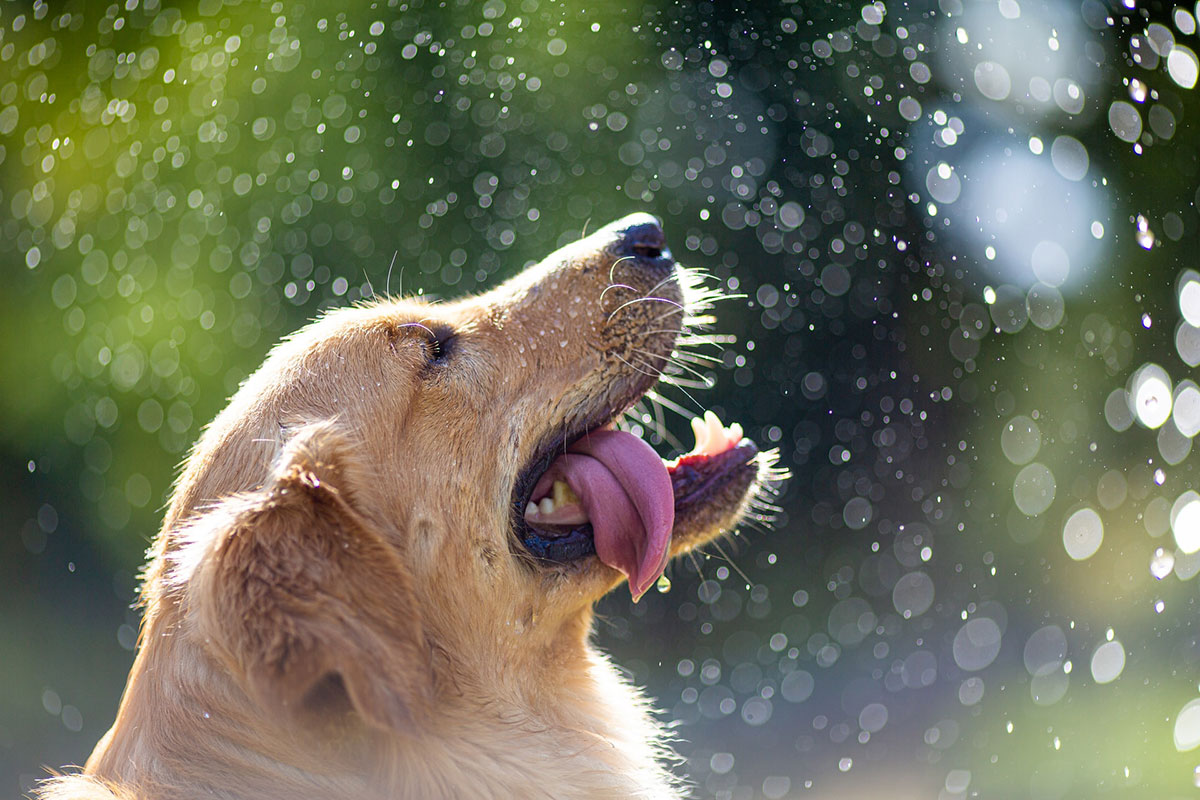Are you losing the silent, serene battle of the night? Does the tender glow of moonlight seem to be your dog’s cue for an a cappella session? If you’re a dog owner, chances are you’ve pondered deep into the twilight hours about how to stop dogs from barking at night. Sleep is precious, and every ‘woof’ chips away at your dreams, leaving you with bleary eyes and sleepy days.
But hark! Whisper no more to the stars for solace, because nighttime dog barking solutions are nigh. No need to tiptoe around the conundrum of quieting a barking dog at night, for we hold the leash to serenity. Let’s embark on a nocturnal quest to reclaim the hush of the night, one gentle “shush” at a time. Follow this witty guide, and you’ll be navigating through tranquil dreams and peaceful nights with your furry friend, as stealthy as a ninja on a silk pillow.
Key Takeaways
- Barking be gone – Crafting a silent night is within your paws’ reach.
- Furry peacekeepers – Teach your dog to trade barks for snores.
- Nighttime symphony – Tune out the barking with harmonious solutions.
- Paw-some dreams – Implement strategies that lead to quiet slumbers.
- Midnight mutters – Understand why your pup’s midnight soliloquy must cease.
- Moonlight musings – Wave goodbye to sleep disruptions with these expert tips.
- Tail-wagging tranquility – Secure restful sleep for you and your canine companion.
Understanding the Nighttime Barking Problem

When night falls, the canine world doesn’t always nestle quietly into dreams. The reality is that our beloved dogs might just be hitting their vocal strides. If the punctuation of barks has turned your night into an infinite sentence without a period, you’re not alone. Gaining insight into the chorus of woofs is the first step towards turning those sleepless sonatas into soothing silences.
Common Causes of Canine Nocturnal Barking
Those nocturnal bark-fests may well be a signal of underlying issues such as fear triggered by the dark, the dull ache of boredom, or the pangs of separation anxiety. Perhaps it’s the sheer surge of unspent energy that’s got Fido concertizing. Identifying the core reasons is tantamount to finding the silent switch to flip the nighttime narrative.
The Impact of Barking on Dog Owners’ Sleep
Make no mistake, the bark-echoed halls at the witching hour don’t just bounce off the walls—they ricochet right into the quality of your sleep. We’re talking about some serious potential health impacts here, as each bark could be chiseling away at your much-needed rest, paving the way for a zombie-like shuffle through your day.
Psychological Triggers of Night Barking
Imagine the world from your dog’s view—a symphony of strange shadows and nocturnal notes can trigger their ancient survival instincts or inner party animal. Yes, your furry pal’s night barking may just be down to a primal party gone wild in their head. So, mastering the art of calming the canine mind could just be your ticket to tranquility.
Now, armed with the knowledge of what makes the dogs tick past twilight, we’re ready to dig up the bones of contention. With the right canine nighttime barking remedies, and tips to stop dogs from barking at night, we’ll soon transition from pillow-plugging nights to dreamy dozes. Next up—it’s all about creating that calm environment for your dog, because peace of mind (and ears) starts at home.
Creating a Calm Environment for Your Dog

As dusk descends and the stars claim the sky, it’s time to weave tranquility into your dog’s nighttime routine. A tranquil environment is paramount to control dog barking at night. Begin with the simple luxury of a bed that beckons your canine with its comfort, perfectly attuned to their size and shape. Such a resting spot, nestled in a sanctuary away from the buzz of the household, whispers a silent lullaby of security into Fido’s ears.
But how do you transform your home into a nighttime nirvana? It may seem like alchemy, but it’s quite achievable. Start with a ballet of dim lights or a gentle nightlight, a decorous dance that signifies slumber is near. This is not just a visual cue; it is a ceremonial dimming of the day, an invitation to stop dog barking at bedtime.
To soften the jarring orchestra of nighttime noises, consider an ensemble of white noise machines or calming music. These ambient minstrels play the song of stillness, creating an acoustic cocoon to reduce dog barking at night. It’s akin to casting an enchanting spell across the room, where the only magic wand is a button press away.
- Install a Comfortable Dog Bed: Reinforce the notion of bedtime as a serene time for rest.
- Leverage Dim Lighting or Nightlights: Enhance calm by signaling it’s time to wind down.
- Use Sound to Your Advantage:
- Utilize white noise machines to muffle jarring nocturnal sounds.
- Play calming music to set a peaceful tone in the environment.
- Introduce Calming Scents: Use pheromone diffusers or essential oils safely, like lavender and chamomile, to soothe and relax your dog.
Lest we forget the olfactory tapestry that weaves its way into a dog’s world—the gentle waft of calming scents. A symphony of pheromone diffusers or a ballet of essential oils, prudently diluted, can cast a calming spell. Envision lavender and chamomile as aromatic guardians warding off stress, setting the stage for a night filled with z’s instead of barks.
In crafting such tranquil environs, we not only curb the nocturnal serenades but also bolster our bond with our canine companions. After all, a dog that revels in the lap of nighttime luxury is one whose silence is a testament to their contentment. So draw the curtains, dim the lights, and let the whispers of night envelop your home in a cocoon of calm.
Establishing a Consistent Nighttime Routine
To secure the hush of night, there’s an artful dance of twilight rituals that promote predictability and foster an atmosphere where dreamland beckons irresistibly to your pup. Behold the power of consistency, the choreographer of your dog’s nighttime psyche, leading them through a ballet of serene evenings.
Promoting Predictability in Your Dog’s Life
Consistency is the metronome that keeps the nocturnal pace; a rhythm your dog comes to know and love. A day wound by the clock, with meals, walks, and playtimes happening as if by celestial design, creates anticipation—a knowing smile on your dog’s snout that it’s nearly time to cuddle into dream’s embrace.
Achieving Calmness Before Bedtime
Like a lullaby whispered on the wind, the pre-sleep serenade is essential to achieve calmness before bedtime. Gentle games, tender massages, or perhaps a puzzle that lazily licks the last drops of wakefulness—these are the notes played to lull your pup into the land of slumber.
Last Call: Pre-Bedtime Potty Tips
Before the stars climb high, one last chorus ensues—the pre-bedtime potty routine. The cue for a final jaunt into the evening air, where the grass murmurs softly, “Do your thing, and then let’s dream,” ensuring a night uninterrupted by nature’s call.

- Designate a consistent and early enough dinner hour to prevent midnight munchies or restless rumbles.
- Cue the quintet of playfulness—an earlier romp to drain the reservoirs of vigor without overstimulation.
- And when the owls hoot softly, the final outing—a potty break gracefully timed to prevent the pitter-patter of needs in the wee hours.
Each step in the routine, meticulously etched in the day, carves the path to a night both you and your canine companion can immerse in the solace of the moon’s soft glow. In this dance, every pirouette of predictability, every plié of peace, harmonizes to cradle your pup in the arms of Morpheus.
- Dinner Time: Let digestion do its dance hours before bed—it’s the first step in our night-time ballet.
- Last Call for Play: A gentle tango to tire out yet not overexcite, brushed with the hues of the setting sun.
- The Final Potty Waltz: A brisk tour of the garden under a twilight sky, signaling the end of the day’s pace.
| Element of Routine | Details | Benefits |
|---|---|---|
| Last Meal | A well-timed meal that allows for digestion before slumber | Prevents middle-of-the-night hunger and restlessness |
| Calm Play | Engagement in quiet, settling activities as bedtime approaches | Reduces excess energy and aids in transitioning to sleep |
| Potty Break | A routine final outing to relieve themselves | Minimizes overnight interruptions |
Exercising Your Dog for Better Sleep

In the pursuit of serenity and sleep, just as humans count sheep, dogs need to leap—and not just in their dreams. It’s a simple equation, where regular exercise for dogs amounts to less nighttime uproar and more of that coveted zzz’s. With their leashes as our wands and the great outdoors as our spellbook, we shall cast enchantments of weariness upon our furry companions, paving the way for tranquil nights.
A stroll isn’t just a stroll—it’s a potion promoting dog health for better sleep, a concoction of movements and sniffs that whisks away the vigor that bubbles beneath that fluffy coat. When the sun cascades its curtain call, shouldn’t our pooches be dreaming rather than causing a ruckus? Absolutely, and here’s how the magic of movement can sprinkle sleepy dust onto those livewire tails:
- Brisk Walks in the Park: Harness the healing power of nature and stretch those four-legged limbs in sync with the chirping choir.
- Fetching Games Till Dusk: A game of fetch is not merely a throw and retrieve—it’s a dance between hound and human, a ritual of fetch that tires the body and eases the mind.
- Spirited Training Sessions: Intersperse commands amidst the fun, as a mental workout is just as soporific as a physical one.
Indeed, engaging in physical activities with your dog is akin to writing a lullaby with their paws, each step a note that hums a calming melody. Mark my words, by the night’s end, those eyes will grow heavy, and those once boisterous barks will slip into soft snores.
- Dawn Patrol: Rise with the roosters and let the cool morning air fill your pup’s lungs, setting a serene rhythm for the day.
- Afternoon Adventure: As the sun climbs high, let your dog dash and dart, emptying their tank of boundless energy.
- Evening Encore: With the stars as your canopy, embark on a final promenade, bidding adieu to the day’s leftover zest.
| Activity Type | Description | Impact on Sleep |
|---|---|---|
| Morning Joy Runs | Start the day with a spirited trot around the neighborhood or park. | Kickstarts metabolism and promotes all-day tiredness, leading to better sleep. |
| Daytime Discovery Walks | An explorative walk filled with new sights and smells. | Stimulates the mind and tires out the body, paving the way for sleepiness. |
| Nighttime Wind Downs | A tranquil stroll to reflect on the day’s adventure and relax. | Helps the dog settle into a restful state akin to a bedtime story. |
Consider this the lullaby of lactate, the sleep-inducing symphony of sniff and sprint. For the nights shall be quiet, the mornings bright, with every wag a testament to the sleep-filled night.
How to Stop Dogs from Barking at Night
As shadows stretch and the moon takes the stage, the night can unfold as a stage for a cacophony of canine chatter. Fear, boredom, and loneliness strike chords in the hearts of our furry companions, urging them to vocalize into the void. But the curtain can be drawn on this nightly performance through thoughtful training and understanding strategies. Let’s dial down the decibels and turn our attention to silencing the doggie decibels after dusk.

At night’s peak, when the stars twinkle in silent judgment of your dog’s barking, you may wonder how to orchestrate a symphony of silence. Fear not, as we begin this quiet quest with desensitization techniques that can transform the frightful into the peaceful.
Desensitization Techniques for Fear-Related Barking
Noise and shadows that whisper the tales of the night can be the villains behind your dog’s bedtime ballads. Approaching these fear factors with the grace of a desensitization maestro, you can help your pup associate once-fearful stimuli with treats and treasures. Gradual exposure teamed with your consistent reinforcement of courage can turn the stage of fear into one of comfort.
Tackling Boredom with Mental Stimulation
As the night’s quiet looms, the murmurs of a bored dog may escalate into an outright oration. Engage your dog’s brain with mental stimulation to tackle boredom; provide a platter of puzzles, a buffet of brainteasers, and a variety of toys as the main course for a mentally satisfied dog. The key lies in weaving these into the daily tapestry, tiring the mind to pave the way for restful repose.
Managing Attention-Seeking and Separation Anxiety Behaviors
Your departure can be the cue for your dog’s solo performance. A heart trembling with separation anxiety may prompt a chorus of barks. Combat these behaviors by teaching quietude on cue, rewarding silence with treats that make them forget the audience they thought they had. A sweater infused with your scent or a sonnet of soft music might comfort the anxious soloist until you return to share the stage. Patience is the truest companion in teaching your dog to hold their applause and barks until the morning light.
- Implement positive reinforcement to sing praises for their calmness
- Offer interactive toys that engage their senses harder than a moonlight mystery
- Shower them with affection and attention during waking hours to reduce their encores at night
In this quiet ballet, where desensitization waltzes with mental stimulation, and attention-seeking twirls with separation, we strive for a night not punctuated by barks, but one that passes with the soft, satisfied breathing of a resting companion. Let every night be a crescendo of calm, every moonrise a salute to silence.
Dealing with Puppy Nighttime Barking
The witching hour arrives and so does the overture of puppy barks that could compete with an owl’s symphony. But lo, this nighttime chatterbox, commonly known as your adorable puppy, is merely broadcasting their wee-hour woes. For puppy nighttime success, the solutions lie within the realms of comfort, habituation, and yes, a touch of puppy psychology. Addressing homesickness and effective crate training are like turning a dissonant nocturne into a calming sonnet.

Setting Up a Puppy for Nighttime Success
Imagine, if you will, a puppy snug as a bug, with dreams of chasing butterflies rather than shadowy fears. For the puppy’s nighttime success, one must weave a comforting nest—a crate placed beside your bed, where the puppy can hear the reassuring rhythm of your breathing. It’s a simple act of proximity that whispers “all is well” to your furry bundle of energy.
Addressing Homesickness and Crate Training
“Every puppy carries a heart yearning for the familiar. To soothe the siren call of homesickness, we look to solutions that nurture their young spirits.”
Easing homesickness involves more than just a comfy bed; it’s about infusing their space with the essence of security. A crate, therefore, shouldn’t be a cold echo chamber but a sanctuary that smells of home—perhaps a blanket they cuddled with before they were yours. With effective crate training, patience twinkles atop the starry sky of your efforts, leading to peaceful nights and jubilant mornings.
- Gradual Introduction: Begin by placing the crate in your room, moving it slowly over time to their permanent sleeping quarters.
- Cozy Comforts: Ensure the crate is a den of delights with familiar scents and soft bedding.
- Night Routine: A pre-slumber sequence from potty breaks to gentle playtime primes your pup for successful solitude.
| Training Technique | Action | Expected Outcome |
|---|---|---|
| Crate Familiarization | Introduce the crate positively with treats and beloved toys. | Transform the crate into a safe haven promoting security and rest. |
| Puppy Nighttime Setup | Strategically place the crate near you for reassurance. | Alleviate feelings of isolation, paving the way for restful puppy slumbers. |
| Fostering Independence | Gradually increase the distance of the crate from your bed to its permanent location. | Cultivate a sense of independence while ensuring the puppy’s comfort. |
Equipped with these nighttime strategies, one can imagine the gentle snores of a puppy, stretched languidly in their crate, dreaming not of loneliness but of tomorrow’s play. So fear not the setting sun, for as it dips below the horizon, your playbook for soothing the night’s barks transforms into whispers of puppy nighttime success.
Navigating Early Morning Wake-Up Calls
As the first rays of dawn stretch their fingers across the sky, some of our four-legged companions seem to think it’s the perfect time for a vocal wake-up call. Not quite the symphony one hopes for at the crack of dawn. Fear not, dear readers, for preventing early morning barking is an achievable feat. It’s all about setting an alarm for puppy needs and shifting morning routines with finesse and strategy.
Sure, puppies may have smaller bladders and need those early breaks, but timed right, you can both catch more z’s. No need for an impromptu bark-alarm when you’ve got a plan. Here’s the score for keeping those mornings serene and bark-free:
- Know thy puppy’s schedule and align it with thy own.
- Diplomatically negotiate the last call of the night to avoid the first light fray.
- Consider a late-night potty rendezvous, set by thy trusty alarm, to outwit the break of day.

Morningtime harmony is not just a dream; it becomes reality with an understanding of each dog’s somnolent needs. For pups, that might mean a scheduled break, while older dogs might just need their internal clocks recalibrated. Look to the table below for a guide on tailoring your approach:
| Age of Dog | Typical Sleep Duration | Strategies for Extended Zzz’s |
|---|---|---|
| Puppies (up to 6 months) | 15-20 hours per day | Last call potty break before midnight; consider an alarm for late-night bathroom trips. |
| Adolescent Dogs (6-18 months) | 14-18 hours per day | Adjust bedtime and wake-up to match developmental changes; engage in evening exercise to ensure tiredness. |
| Adult Dogs (18 months+) | 12-14 hours per day | Shift morning routines gradually to align with desired wake-up time; maintain consistent schedule. |
There you have it. By considering the needs of our canine friends and gently nudging their routines, we can prevent melodic mornings orchestrated by barking. It’s a symphony of consistency, anticipation, and understanding that leads to restful slumbers and silent sunrises.
Conclusion
As the ink-black shroud of night descends, and the rest of the world sinks into slumber, dog owners have often been left grasping at the end of their frayed wits, seeking the elusive solution to their pups’ nocturnal symphonies. Guided by the stars of wisdom revealed within these pages, a symphonic silence is firmly within reach. We’ve shuffled through the twilight maze, lighting our way with a comprehensive strategy for quiet nights that were once punctuated by barks and howls. A question whispered into the velvety darkness—how do we traverse this journey to peaceful slumbers? We’ve discovered the spell, mixing exact measures of understanding, support, and unwavering consistency.
Putting It All Together: A Strategy for Quiet Nights
To muzzle the midnight mutterings, we dove deep into the wells of our canine’s psyche, surfacing with pearls of profound knowledge to overcome nighttime dog barking. The recipe for repose: satiate their physical energy with daytime endeavors, tickle their intellect with tantalizing puzzles, and cradle their separation woes with the gentle touch of understanding. The path is clear, lined with the markers of positive reinforcement and the milestones of conquering anxiety. Together, these strategies form a finely woven tapestry under which both humans and their four-legged friends can slumber in symphonic silence.
Reflecting on the Journey to Peaceful Slumbers
Throughout the crescent moons and rising suns, the journey to peaceful slumbers has been a concerto of diligence and devotion. Upon this twilight trek, we’ve gathered countless tales of dogs’ whispers turning to soft snoozes, and the battle cries of the night dissolving into dreamy sighs. The reverberations of our efforts echo not just through the silent halls but in the harmonious hearts of every dog and owner duo, now basking in the glow of restorative rest. So wrap yourself in the mantle of moon-kissed memories, for your nights shall now be stories of dreams, unbroken by the call of the wild within your companion.
Additional Reading
Also take a read of our in depth article covering over 100 tips and advice on how to stop dogs from barking.
FAQ
What are some common causes of canine nocturnal barking?
The nightly serenades can stem from fear, boredom, the need for attention, or the pang of separation anxiety. It can be up to us, their puzzled human friends, to play detective and pinpoint the exact reasons behind their after-hours verbosity.
How does a dog’s barking affect owners’ sleep?
Think of it as an impromptu wake-up call you never signed up for—nighttime barking can periodically pull us from the sweet embrace of sleep, leading to reduced sleep quality and potentially making us as cranky as a cat in a bathtub.
What psychological triggers might cause a dog to bark at night?
Dogs, like humans, can have their little quirks and nighttime neuroses. Your furry friend might be feeling a tad anxious when left alone, a little edgy about mysterious night sounds, or simply haven’t had enough playtime to wear them out.
Can creating a calm environment help control dog barking at night?
Absolutely! Think zen. Transforming Fido’s sleeping area into a snooze-friendly zone with a comfy bed, some gentle lighting, and perhaps a dab of calming scents can help remind your pooch that night time is for catching Z’s.
How does promoting predictability in a dog’s life reduce night barking?
Dogs love routine—it’s like their favourite chew toy. Knowing what to expect at night before dreamland beckons can quiet those nocturnal arias.
Why is exercising your dog important for preventing night barking?
Wearing out your woofer with a medley of fetch, romps in the park, and stimulating training, isn’t just good for their waistline; it also makes their eyelids heavy come nightfall. A tuckered-out tail-wagger is less likely to hold midnight concerts.
What desensitization techniques work for fear-related dog barking?
Slow and steady exposure to their fear factors coupled with delicious treats or praise when they keep it cool can help them learn that the dark, much like an inflated vacuum, isn’t so scary after all.
How can you tackle boredom to prevent nighttime dog barking?
Mind games—no, not those kinds—like puzzle feeders and toys can keep your pooch busy and mentally tired, thus less likely to start barking up the wrong tree when they should be snoozing.
How can I manage my dog’s attention-seeking and separation anxiety behaviors?
Most dogs are smarter than they get credit for and can learn that silence can actually attract more attention than barking. Training a “quiet” command and praising their mute-button moments can be a game-changer, plus leaving behind something that smells like you can be the doggy-equivalent of a comforting nightlight.
What are your tips for setting up a puppy for nighttime success?
Create a den-like, sleepy sanctuary, to begin with. Position the crate close to where you sleep so they’re assured by your presence, and then gradually ease it away as they grow more confident. Good things come to those who wait (and so does uninterrupted sleep).
How do I deal with a puppy’s homesickness and crate training during the night?
Sing them a lullaby—kidding! Start by placing something that smells like home in the crate with them. A plush toy to snuggle with or a ticking clock can also mimic the heartbeat of a littermate and can work wonders.
Any advice for preventing early morning dog barking?
Sometimes the early bird is just a dog with a plan. Try last-call bathroom breaks, and if your canine companion is still an early riser, you might consider adjusting their morning itinerary to sync with the sun rather than pre-dawn chirping birds.
Can a comprehensive strategy help achieve quiet nights and overcome nighttime barking?
For sure! Think of it as a doggy decrescendo. Mixing right elements from exercise, routine, and training, all while tackling the root of those barks, can help you and your best friend drift into a quieter, more peaceful nocturne.
What’s the journey to peaceful slumbers like with a persistently barking dog?
It’s a bit like a rollercoaster at first—ups, downs, and the occasional loop-de-loop. But with persistence, consistency, and maybe a few bags under your eyes, the reward is a silent night and a well-rested you and pooch.






